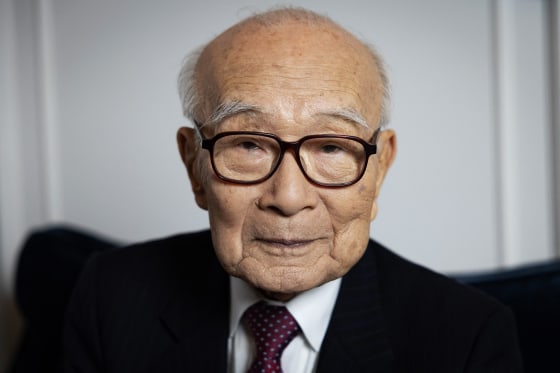
On behalf of his anti-nuclear weapons organization, a 92-year-old Japanese survivor of the 1945 U.S. atomic bombing of Nagasaki won this year’s Nobel Peace Prize on Tuesday, recounting the atrocities he saw.
In October, Nihon Hidankyo, better known as the Ashibakusha, a group of survivors of the U.S. atomic bombings of Hiroshima and Nagasaki, was granted the Nobel Peace Prize. Established in 1956, the group has fought for almost 70 years to eradicate nuclear weapons worldwide by trying to keep their use taboo.
Japan’s surrender to the Allies to conclude World War II was accelerated in 1945 when the United States utilized the bombs for the first and only time in the two Japanese cities. An estimated 140,000 people had died in Hiroshima and 70,000 in Nagasaki as a result of the bombings by the end of that year, but the death toll kept rising for decades as individuals died from the long-term effects of radiation exposure.
With the potential to cause harm hundreds or thousands of times greater than what was done in Hiroshima and Nagasaki, nuclear weapons have now proliferated around the world. Many Hibakusha worry that as they become older, the stigma attached to the use of nuclear weapons will lessen and their tales will be forgotten.
In his acceptance speech in Oslo, 92-year-old survivor Terumi Tanaka stated that Russia, the nuclear superpower, has threatened to use nuclear weapons in its war against Ukraine and that an Israeli cabinet member even mentioned the potential use of nuclear weapons during Israel’s relentless attacks on Gaza in Palestine.
Tanaka, one of the three chairpersons of Nihon Hidankyo, expressed his sadness and displeasure at the prospect of breaking the nuclear taboo.
According to Tanaka, there are currently 12,000 nuclear weapons in the world, 4,000 of which are operationally deployed and prepared for instantaneous launch.
In his opening remarks, Norwegian Nobel Committee chair Jørgen Watne Frydnes stated that the hibakusha’s task was more important than ever.
According to him, none of the nine nuclear-armed nations—the US, Russia, China, France, the UK, India, Pakistan, Israel, and North Korea—seem to be interested in nuclear disarmament and arms control at this time. Instead, they are expanding and updating their nuclear weapons.
The International Campaign to Abolish Nuclear Weapons, which received the Nobel Peace Prize in 2017, said in June that $10.7 billion more was spent on nuclear weapons worldwide in 2023 than in 2022.
According to Frydnes, the committee is urging new nations to ratify the Treaty on the Non-Proliferation of Nuclear Weapons and urging the five nuclear-armed nations that have signed it—the United States, Britain, China, France, and Russia—to take their commitments seriously.
It is naive to believe our civilization can survive a world order in which global security depends on nuclear weapons, he said. The world is not meant to be a prison in which we await collective annihilation.
Tanaka was 13 years old when the U.S. bombed Nagasaki on Aug. 9, 1945, three days after detonating the first atomic bomb over Hiroshima.
Tanaka, who was at home just a couple of miles from where the bomb hit, said he heard the buzzing sound of a bomber jet and was then engulfed in a bright, white light. An intense shock wave followed, crushing his house and others.
He saw the full devastation three days later when he and his mother went looking for the families of two of his aunts, who lived closer to ground zero.
He found the charred body of one aunt at what remained of her house, along with the body of her grandson, a university student. At his other aunt s house, his aunt died just before they arrived, while his grandfather was on the verge of death, having been severely burned all over his body.
His uncle, who at first had seemed mostly unharmed, later died after leaving the area to seek help.
The deaths I witnessed at that time could hardly be described as human deaths, Tanaka said. There were hundreds of people suffering in agony, unable to receive any kind of medical attention.
I strongly felt that even in war, such killing and maiming must never be allowed to happen.
Tanaka said the average age of atomic bomb survivors is now 85, and that he hoped the next generation would find ways to build on their advocacy efforts.
I hope that the belief that nuclear weapons cannot and must not co-exist with humanity will take firm hold among citizens of the nuclear weapon states and their allies, he said, and that this will become a force for change in the nuclear policies of their governments.
Note: Every piece of content is rigorously reviewed by our team of experienced writers and editors to ensure its accuracy. Our writers use credible sources and adhere to strict fact-checking protocols to verify all claims and data before publication. If an error is identified, we promptly correct it and strive for transparency in all updates, feel free to reach out to us via email. We appreciate your trust and support!
